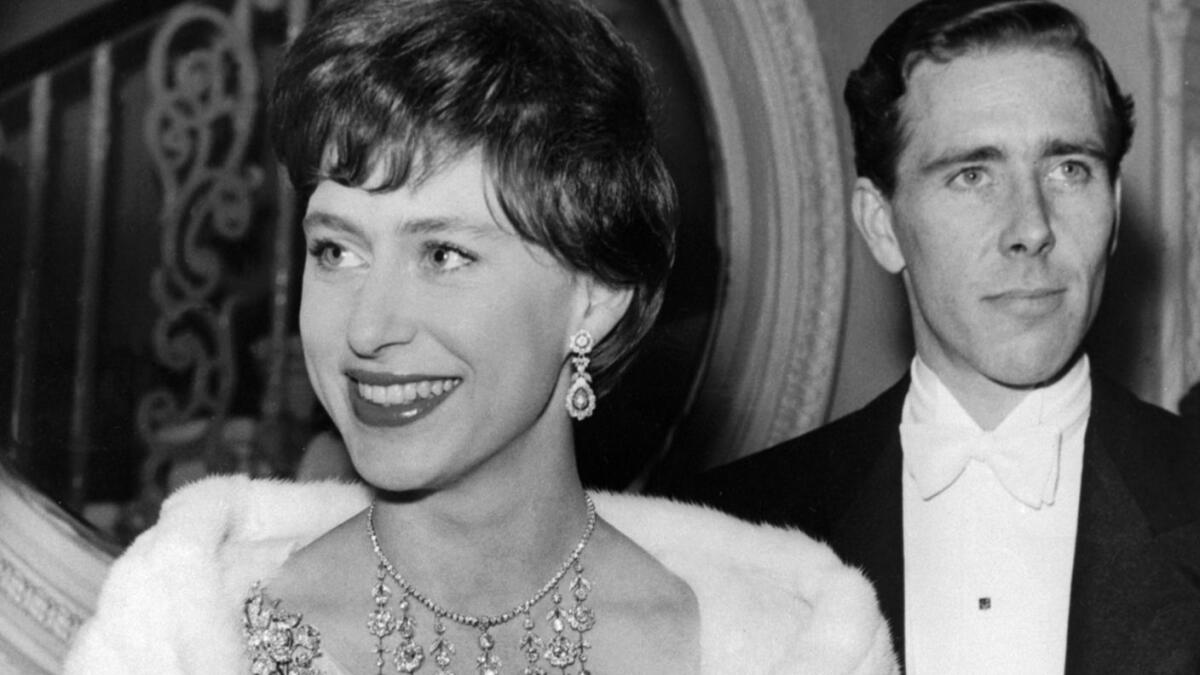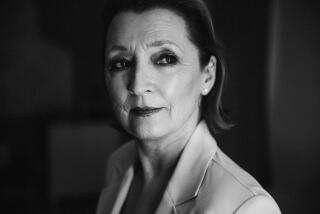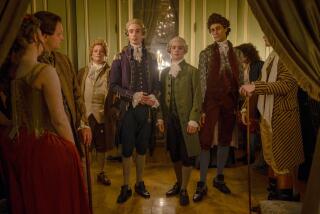Celebrating Princess Margaret’s birthday and her high style in Britain

Reporting from London — Throughout her life, Princess Margaret was known as a royal rebel, the member of the British royal family who dared push against tradition and carve out her own path.
Sister to Queen Elizabeth II, Margaret was brash, fiery and independent — and famous for presenting herself to the world with a distinctive sense of style. The princess, who died in 2002 at age 71, was an undeniable fashion icon whose legacy continues to resonate today.
“She was a complete leader, really,” says actress Vanessa Kirby, who is Emmy nominated for portraying Princess Margaret in the first two seasons of Netflix’s “The Crown.” “On the world stage, she would set trends. And she was also very, very connected to it emotionally. She was at the Chanel shows in Paris and knew all the designers, and all the designers wanted to design for her.
“She was fashion-forward, especially into the ’60s. We got to play so much with that in the second season. I’m not particularly fashionable myself, so she taught me so much about it.”
There were several key factors in Margaret, who would be celebrating her 88th birthday Aug. 21, becoming a fashion icon. She donned top-end couture gowns from London and Paris during the ’40s and ’50s, often drawing criticism for wearing non-British designers. She was an early adopter of Christian Dior’s 1947 “New Look” style, an aesthetic defined by long, full skirts and cinched-in waists, and she quickly became one of Dior’s favorite clients.
“The look was rather controversial to start with, as it required a considerable amount of fabric, which was still rationed in Britain as a result of shortages after World War II,” says Eleri Lynn, collections curator for the royal ceremonial dress collection at the Historic Royal Palaces. “Despite seeming to break the rules by wearing the New Look, Margaret helped popularize the fashion and made the silhouette one of the most iconic styles of the 20th century. British court designers soon started to adapt their collections to emulate Dior.”
Alexandra Kim, former collections curator at the Historic Royal Palaces, believes that “her position, her youth and her beauty were all key factors in her status as a fashion icon.”
“It’s not just the inherent draw of her royal status, but also that as the younger sister, who did not have the same weighty role as her sister, an interest in fashion and clothes was seen as more fitting and acceptable,” Kim added.
“I think that youth and beauty are always big draws, and her ability to wear some of the most beautiful clothes of the late ’40s and ’50s made her a figure that women wanted to emulate. Dior talked about her being a real fairy-tale princess.”
The advent of the swinging ’60s brought a new style to London, and it was one that Margaret quickly integrated into her own look. Fashion trends began to come from the streets instead of couture houses, which Margaret embraced. It’s that aesthetic that Jane Petrie, costume designer on the second season of “The Crown,” was tasked with re-creating. Instead of exactly replicating photographs of Margaret, Petrie aimed to channel the princess’ spirit with each ensemble.
“We were trying to tell a visual story of the two sisters, one stuck inside the palace and one very much in touch with the outside world,” says Petrie, who is Emmy nominated for period costumes. “With Margaret, it was all about trying to capture the essence of the time, with the onset of the swinging ’60s and the London nightlife that became very different, very quickly. It was moving quickly forward in the world, whereas the palace was becoming more out of touch. We looked at how to say all of that in how we dressed Margaret.”
Petrie took inspiration from many of Margaret’s iconic looks, but only one piece was re-created exactly: her wedding dress. In May 1960, Margaret married fashion photographer Antony Armstrong-Jones (also known as Lord Snowden) at Westminster Abbey, and it was notably the first royal wedding to be broadcast on television.
She wore a silk organza dress designed by Norman Hartnell that famously used more than 30 yards of fabric in its skirt and the Poltimore Tiara, a look that was simple and contemporary. Petrie enlisted a couture cutter to remake the dress for the wedding episode.
“If you look at the other wedding dresses of the period — I looked at a lot of wedding dresses of the period — and they were much fussier,” Petrie notes. “This was clean and fresh and definitely forward-thinking.”
Kirby recalls that it felt “really profound, actually, to walk in the same dress she did.”
“For Margaret, it was always about who she was going to marry and who she couldn’t and who she wanted to,” Kirby added. “So to actually walk down the stairs in that dress was a great moment. And it was a much more modern dress than I think people expected.”
Many royalists remember Margaret’s wedding dress. But for Lynn, the princess’ most iconic look involves a different instance with the Poltimore Tiara.
“The iconic image in question is of her in the bath at Kensington Palace, taken by her photographer husband, Lord Snowdon, in the early 1960s, wearing nothing but the priceless Poltimore Tiara,” Lynn says. “Snowdon captures himself in the mirror, camera in hand. It shows the young couple as a modern, daring, fashionable force, with Kensington Palace the center of this glamorous world.”
The portrait of Margaret in “The Crown” and in other accounts is complicated — she was a self-centered snob as well as a rebel. A new book by Craig Brown, “Ninety-Nine Glimpses of Princess Margaret,” portrays her as an undeniable wild child, often partying, drinking and smoking.
But even for those who didn’t follow royal gossip, Margaret’s image was its own rebellion. She dared to wear dark, oversize sunglasses during a time when protocol dictated that members of the royal family be visible to the public outside the palace, and she donned trousers and short skirts.
In some ways, Margaret’s desire to break royal protocol is mirrored today by Meghan Markle, Duchess of Sussex. Since marrying Prince Harry in May, Markle has been criticized for allowing her bra to be glimpsed through her dress, skipping stockings and for wearing her hair in a messy bun.
“I think that there is a definite sense that Meghan Markle, like Margaret, has more freedom in her fashion choices, especially in comparison to the Duchess of Cambridge,” Kim says. “Many commentators have picked up on the fact that she didn’t wear tights or stockings for her engagement photograph, that she’s worn off-the-shoulder dresses for daytime events and worn colored nail [polish].
Margaret represented the beginning of the current obsession with royal fashion (although many British people were equally obsessed with the looks of Queen Victoria earlier on). In the 1950s, Margaret’s outfits appeared on the covers of newspapers and in fashion magazines, and many women attempted to sew their own versions of the dresses at home. Margaret was a celebrity in her own right, and the public always wanted to know what she wore.
“The media was very different then,” Petrie notes. “You felt that you were getting a look at something unusual. There are a lot more faces out there wearing those expensive clothes now. Back then, you’d have your favorite whose style you wanted to copy and you’d wait to see them.”
The renewed interest in Princess Margaret is due in no small part to “The Crown.” Kirby is handing the reins over to Helena Bonham Carter, who will portray Margaret for the next two seasons. For Kirby, Margaret’s legacy lies in her being an independently minded woman who urged her own way forward, both in fashion and in life.
“I felt so lucky to play someone so bold and unpredictable and fiery and compassionate,” Kirby says. “I got to feel all the range of feelings with her, and I’m so grateful for that. That’s what she’s given me, and I think lots of people remember those qualities about her. I didn’t know much about her when I started, to be honest, and now I just completely love her.”
More to Read
The complete guide to home viewing
Get Screen Gab for everything about the TV shows and streaming movies everyone’s talking about.
You may occasionally receive promotional content from the Los Angeles Times.






